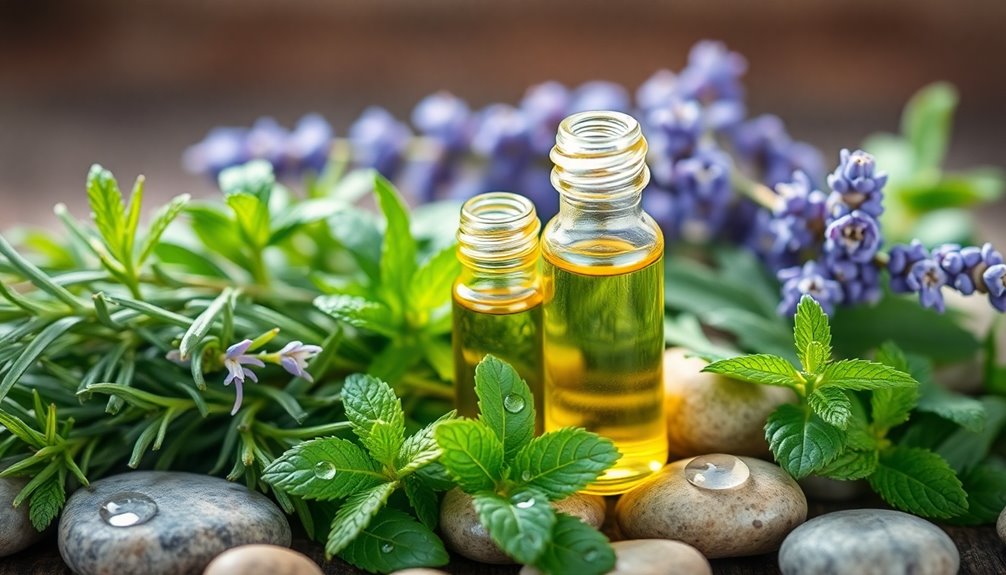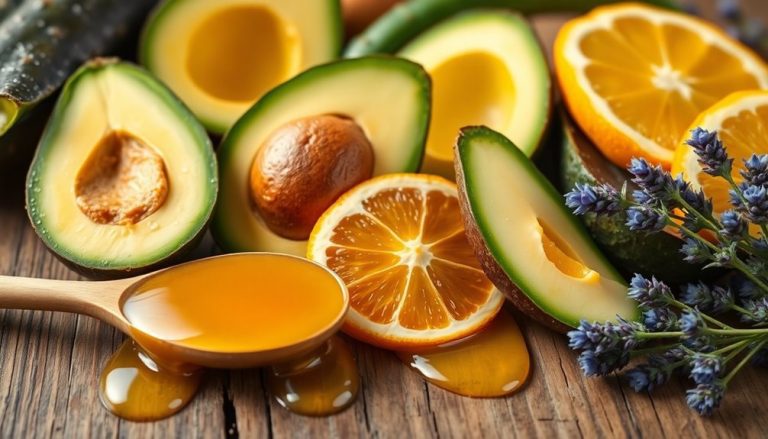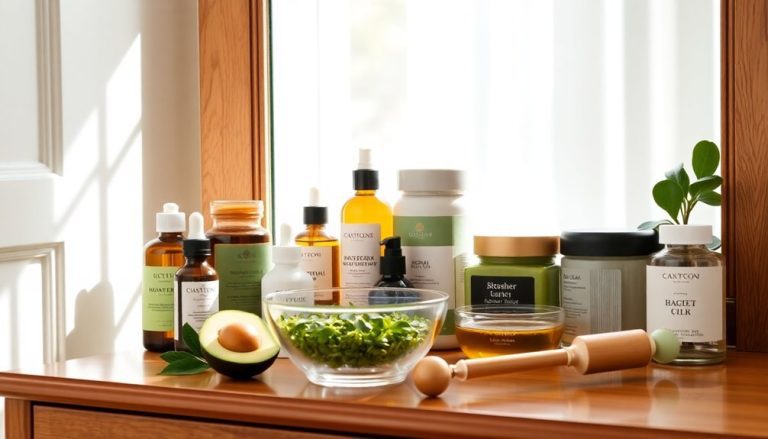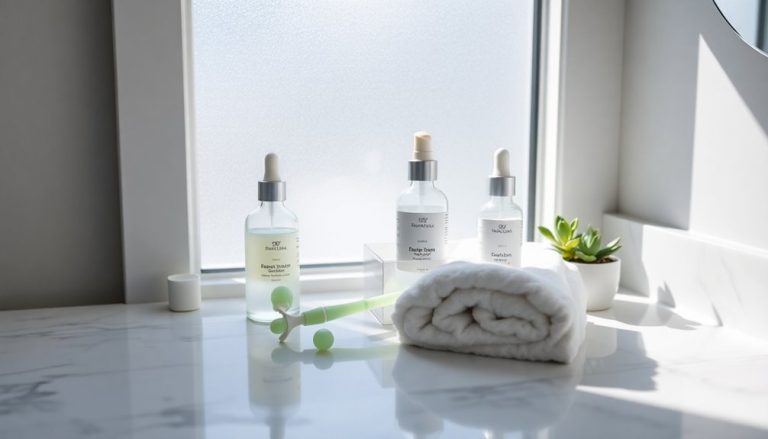If you're battling acne-prone skin, consider tea tree oil, aloe vera, and green tea as herbal remedies. Tea tree oil boasts antibacterial properties that can reduce inflammation and target blemishes effectively. Just remember to dilute it with a carrier oil to prevent irritation. Aloe vera offers soothing and hydrating benefits, promoting healing and reducing scarring when applied directly to breakouts. Green tea, rich in antioxidants, can be used as a toner and helps tighten pores while controlling oil. Incorporate these remedies into your routine, and you might discover even more helpful tips for healthier skin.
Key Takeaways
- Tea Tree Oil: Known for its antibacterial properties, it reduces acne-causing bacteria and inflammation when applied diluted to blemishes.
- Aloe Vera: Its soothing gel hydrates and calms irritation, promoting healing of breakouts and reducing acne scarring.
- Green Tea: Rich in antioxidants, it can be used topically to tighten pores and reduce oil production while offering internal anti-inflammatory benefits when consumed.
- Application Techniques: For best results, apply diluted tea tree oil directly, use aloe vera gel on breakouts, and create a green tea toner for daily use.
- Consistency: Regular use of these remedies in a daily skincare routine maximizes benefits and promotes clearer skin over time.
Tea Tree Oil
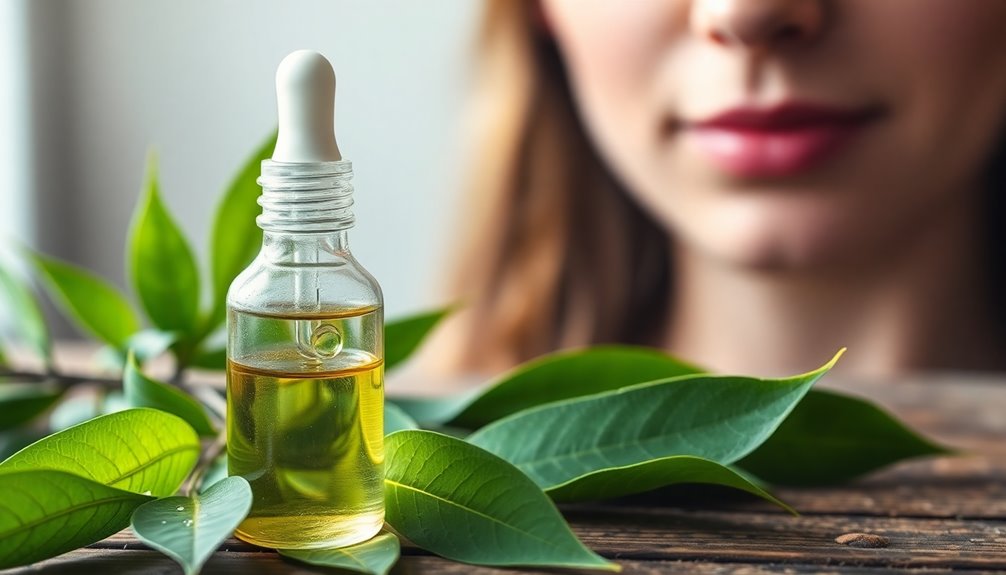
Tea tree oil is a powerful natural remedy known for its effectiveness against acne. If you're struggling with breakouts, incorporating this essential oil into your skincare routine could make a significant difference. Its antibacterial properties help to combat the bacteria that often contribute to acne formation. By applying tea tree oil, you can reduce inflammation and redness, making your skin look healthier. Using a proper acne foam cleanser can also aid in keeping your skin clear.
To use tea tree oil, dilute it with a carrier oil like coconut or jojoba oil. This prevents any irritation, especially if you have sensitive skin. You can apply the mixture directly onto blemishes or use it as a spot treatment. Just a few drops can go a long way in targeting those pesky pimples.
You can also add tea tree oil to your cleanser or moisturizer, but always patch-test first. Additionally, using a concentrated Tea Tree Oil Serum can enhance the benefits of this essential oil for clearer skin. Consistency is key, so incorporate it into your daily routine for the best results.
Aloe Vera
Aloe vera is a soothing powerhouse for acne-prone skin. Its natural antibacterial and anti-inflammatory properties can help calm irritation and redness, making it a fantastic addition to your skincare routine. When you apply aloe vera gel directly to your breakouts, you're not just hydrating your skin; you're also promoting healing.
To use it effectively, you can scoop out the gel from a fresh aloe vera leaf or opt for a store-bought product that contains a high percentage of real aloe. Apply a thin layer to your face, focusing on areas with active breakouts. Leave it on for about 20 to 30 minutes before rinsing it off with lukewarm water. You'll notice that your skin feels refreshed and less inflamed.
Incorporating aloe vera into your routine can also help with the scarring that often follows acne. It encourages skin regeneration, allowing new, healthy skin to surface more quickly. Additionally, aloe vera gel contains natural moisturizing properties, which can further enhance your skin's hydration and overall appearance. It's important to note that many effective acne treatments include ingredients that complement aloe vera's benefits.
Plus, it's gentle enough to use daily, so you can enjoy its benefits regularly without worrying about irritation. Give aloe vera a try, and you might just find it's the natural remedy your skin has been craving.
Green Tea
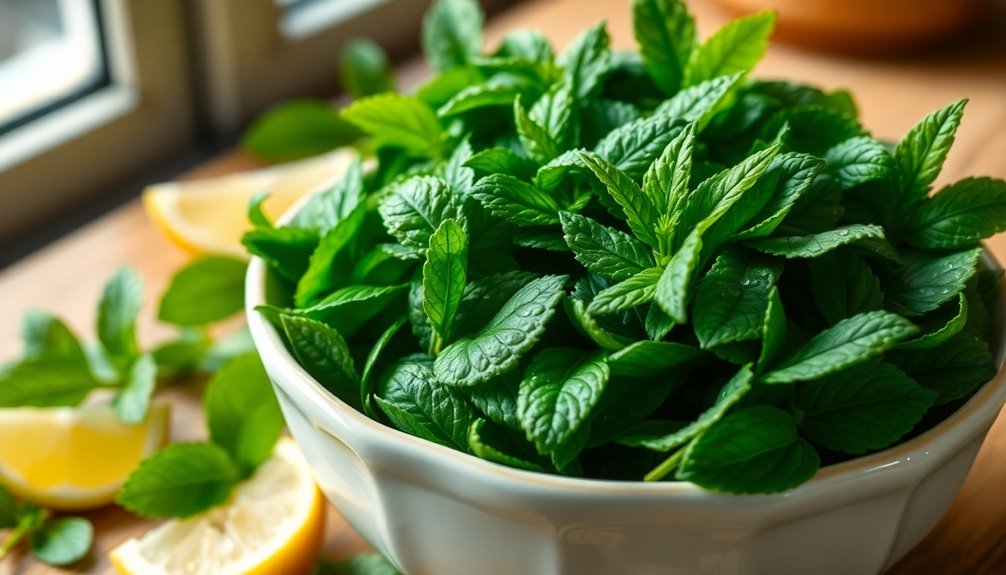
Green tea is a powerhouse when it comes to combating acne-prone skin. Packed with antioxidants, particularly catechins, it helps reduce inflammation and fight bacteria that contribute to breakouts. When you apply green tea topically or drink it regularly, you can significantly improve your skin's overall health.
You can easily incorporate green tea into your skincare routine. Brew a strong cup, let it cool, and use it as a toner. Just soak a cotton pad in the tea and gently apply it to your clean face. This method helps to tighten pores and reduce excess oil.
If you prefer a more concentrated approach, consider green tea extract in your skincare products or even make a DIY face mask by mixing brewed green tea with honey and yogurt.
Drinking green tea also offers internal benefits. Aim for two to three cups daily to help reduce acne flare-ups. The anti-inflammatory properties can help calm your skin from the inside out. Additionally, combining green tea with Vitamin E oil can enhance your skin's healing process and provide added moisture.
Frequently Asked Questions
Can Herbal Remedies Replace Conventional Acne Treatments?
You can explore herbal remedies as an alternative to conventional treatments, but they might not fully replace them. It's essential to consult a healthcare professional to determine the best approach for your specific skin needs.
Are There Side Effects of Using Herbal Remedies for Acne?
Using herbal remedies can sometimes feel like dancing on a tightrope. You might experience side effects like skin irritation or allergic reactions. It's wise to patch-test and consult a professional before diving in.
How Long Does It Take to See Results From Herbal Treatments?
You'll typically notice results from herbal treatments within four to six weeks. However, individual experiences vary, and consistency is key. Stay patient and give your skin time to respond to the natural remedies you're using.
Can I Mix Different Herbal Remedies for Better Results?
Mixing different herbal remedies can create a symphony of healing, but be cautious. Each herb dances uniquely; some might clash. Experiment gently, observe your skin's response, and let nature guide your blend for optimal results.
Is It Safe to Use Herbal Remedies During Pregnancy?
It's crucial to consult your healthcare provider before using any herbal remedies during pregnancy. Some herbs can affect fetal development or interact with medications, so getting professional guidance ensures you and your baby stay safe.
Conclusion
By embracing these herbal remedies, you're not just treating your acne-prone skin; you're nurturing your self-confidence and reclaiming your natural glow. Imagine looking in the mirror and feeling proud of your reflection, free from the shadows of blemishes. With tea tree oil, aloe vera, and green tea by your side, you've got nature's best tools to help you on this journey. Remember, your skin deserves love, and these remedies are the first step toward that radiant you.

